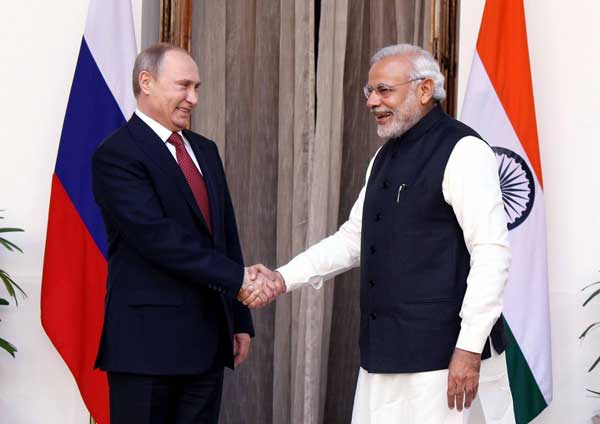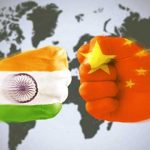IDR Blog
Russia-India Relationship Perspectives Beyond 2018

Russia-India relationship beyond 2018 in terms of perspectives does not offer the same optimism and generate the same fizz as it did till before the disintegration of the Former Soviet Union. Geopolitically and in terms of strategic embrace, Russia at turn of Millennium swung towards China and India moved strategically closer to the United States. The reverse swing by both Russia and China was both geopolitical and geostrategic.
In 2018 despite the Sochi Summit between Russian President Putin and Indian PM Modi in mid-2018 and the flying visit of President Putin to New Delhi in October 2018, notwithstanding, the elevation of the Russia-India Strategic Partnership to one of “Special Strategic Partnership”, the perspectives have not acquired any special or privileded contours or hues suggesting that Russia and India are moving closer to reclaim the earlier fervour of the Indo-Soviet Friendship Treaty. That is history now.
The crucial question that needs analysis is that whether it was Russia or India that made the opening moves in moving away strategically from each other in opposite directions?
Contextually, the reversal in Russia-India relations needs to be viewed in relation to the major events of the 1990s.The Former Soviet Union disintegrated in 1991 and consequently stood displaced from its Superpower status in a bipolar world. Russia confronted by United States as the unipolar Superpower with Cold War mindsets continuing and geopolitically and economically weakened turned towards China which offered multi-billion dollars energy contracts and arms supplies.
The period 2001-2010 witnessed the solidifying of the Russia-China Strategic nexus brought about major strategic convergences developing in relation to the United States. Russia need economic resuscitation and China needed additional existential power of the former Superpower albeit diminished.
The growing strategic nexus of Russia with India’s prime military threat, that is China, seemed to have woken up the Indian policy establishment in its quest for an alternative countervailing power. Fortunately for India at this stage it had a non-Dynasty Congress Prime Minister, PM Narasimha Rao who initiated a complete reversal of India’s foreign policy and economic liberalisation directions.
United States and India were drawn together at his juncture by strong strategic convergences in relation to China’s militaristic rise. The first decade of 21st Century witnessed the first steps in the evolution of strategic proximity between United Sates and India.
In 2018, geopolitically, India is on an ascendant power trajectory, both strategically and economically. India is now an active partner of the United States in terms of the putting together of the US-led Indo Pacific Security Template. India along with Japan is viewed as one of the two pillars of Asian Security, and as an existential counterweight to China’s rising power.
So how does one describe Russia-India relationship in 2018? How does one describe Russia’s change in its South Asian policies by gravitating towards Pakistan? Can Russia in terms of future perspectives be expected to de-link itself from its Strategic Nexus with China?
Russia-India relationship in 2018 does not suggest that it has evolved into a ‘Special Strategic Partnership’ going by Russia’s stances on global and Asian security issues. In my assessment Russia-India relationship today is basically confined to an arms supplier relationship which is more of a limited commercial relationship. Russia gets good Indian money for Russian arms supplies to India and India gets some advanced technology weapon systems which other sources cannot supply.
Presently, to me, it seems that Russia and India geopolitically have adopted ‘hedging strategies’ catering for eventualities where China may swing once again towards the United States and India caters for some unpredictability in US geopolitical stances.
Russia further widened the fault lines in Russia-India relationship under the influence of Russian Presidential Adviser Zamir Kabulov in gravitating towards Pakistan in terms of South Asian policy formulations especially on Afghanistan. Russia may have intended it to be only political signalling to India peeved by growing US-India strategic ties. But a damaging dent was inflicted by Russia on Indian public opinion, if not on Indian policy establishment.
Russia’s above misperceived political signalling to India worsens further when Indians perceive it to be coincident with China’s strategic moves to reinforce Pakistan as a counterweight to India in South Asia.
Can Russia in terms of future perspectives be expected to de-link itself from China and the Russia-China Strategic Nexus? This is a complex question as it brings into play not only Russia-India equations but also Russia-US equations and China-US equations.
Geopolitical compulsions currently in play and likely to persist, offer no indicators that Russia would be inclined or even seriously consider resetting its China policy or jettisoning its commitment to the continuance of the Russia-China Strategic Nexus. Russia has persisted in sticking to this Nexus in the years when strategic analysts were designating that Russia had accepted a junior partnership with China. In 2018, Russia despite its resurgence and reclaiming its Great Power status still persists with this geopolitically expedient relationship with China.
The above perspective cannot be ignored by India in terms of its foreign policy formulations right upto a mid-term time frame. This perspective in terms of geopolitical power-play places Russia firmly allied with China—-a country in an adversarial confrontation with India. Russia has not made even a semblance of an attempt to soften China’s covert and overt strategies adversely affecting Indian national security interests. Worse, China has managed to inveigle Russia into changing its decades old South Asian policies to now cavort with India’s other ‘enemy state’ that is Pakistan.
Even that would have been understandable in India but how should India read Russia’s intentions when it has commenced arms sales to Pakistan which in any case China was already doing massively. Russia fully well knows that all offensive armaments supplies to Pakistan enhance Pakistan’s war-waging capabilities against India. Today’s press reports are more disconcerting where Russia is discussing a massive sale of T-90 tanks to Pakistan with Pakistani requirements being quoted as 400 tanks.
Surely, none of the above actions of Russia qualifies it to be eligible for a Special Privileged Strategic Partnership with India? When Russia still continues to look at India with prospects of arms sales to India concurrently only goes to prove my contention that the Russia-India relationship stands reduced to a commercial relationship defined by arms sales and surely with no strategic or geopolitical underpinnings. It further reinforces my contention that Russia’s current relationship with India is just a mere Russian ‘Hedging Strategy’ more impelled by India’s growing geopolitical stature.
In light of the above discussion, what are India’s options? Can India tear itself away from its existing but frayed relationship with Russia? What will be the strategic costs of India tearing itself away from its decade’s old relationship with Russia? What can induce Russia to devalue its Strategic Nexus with China?
India cannot tear itself away fully from its defence supplies relationship with Russia simply because of the fact that Indian military inventories though not predominantly of Russian origin, there is still a dependency of about sixty percent. Presumably, it will take a decade or so before this dependency figures change. Till then, in the absence of any strategic underpinnings or of any ‘special friendship prices’ Russia-India relationship would continue as a purely commercial arms/arms spares supplies.
Strategic costs can only accrue if in 2018 if the Russia-India Special Privileged Strategic Partnership was weighted heavily with great strategic gains for India in the Asian power-play or Russia giving unstinted strategic support to India on global issues. That sort of strategic fizz of yore is absent. The benefit of doubt could have been given by India as it was being done till about a couple of years back when Russia commenced its flirtation with Pakistan.
Russia’s confirmed high-technology armaments sale to Pakistan implicitly coveys an unambiguous message to India that Russia has no qualms in building-up the war waging capacities of Pakistan intended for use against India. Russia joining the China-Pakistan-Russia Trilateral on Afghanistan also severely impinges on India’s national security stakes in Afghanistan.
India is in no position to induce Russia to move away from its Strategic Nexus with China. Even if India reverses gears to move back fully to the Russian orbit, even then, Russia would not dispense with its commitments to the Russia-China Nexus.
The major inducement for Russia to move away from the Russia-China Strategic Nexus has to originate from the United States. If the United States resets its Russia-policy formulations by giving up Cold War mindsets predominating Washington policy processes and United States concedes to endow the earlier geopolitical equivalence of Russia’s power status wrongly endowed on China, then there is hope that Russia may be induced to dispense wish its Strategic Nexus with China.
While on the subject of Russia-India relationship in terms of post-2018 perspectives, one cannot escape not analysing that in the decade to come would a restored original flavour of Russia-India Friendship Treaty strategically outweigh the burgeoning US-India Strategic Partnership? In my considered assessment the proximity that stands accrued both in terms of geopolitical value and strategic and military content, the future perspectives suggest that India would be wise in building additional high-value blocks in the US-India Strategic Partnership. This is realities that will persist despite any passing ambiguities that may occur.
The evidence of the above assertion is borne out when the Asia Reassurance Initiative Act was passed both by the US senate and the House if Representatives. It endows a US bipartisan recognition of India’s Major Power role in Asian Security and Indo Pacific Security while castigating China for its demonstrated aggressive record.
Concluding, it needs to be observed that while Russia cannot be completely taken off from India’s geopolitical radar, it cannot be invested with grandly exaggerated contours of strategic gains for India where none exist. Nor can India extend the excuse that it would be unwise in placing all its strategic eggs in one basket. It would also be unwise for India to exploit the faded Russia-India relationship for political signalling to the United States in moments of US ambiguities.
Post your Comment
One thought on “Russia-India Relationship Perspectives Beyond 2018”
 Loading Comments
Loading Comments




Good article.
Russia is resorting to Indian arm twisting tactics by selling weapons to India’s arch rival Pakistan . The Russia has also developed close defence relations with China . Russia has recently sold top of the line Su35 fighters and S-400 system to China which will be used against India . Needless to say , China will soon create a cheap pirated imitation copy of these Russian systems by reverse engineering and produced at fraction of the cost which will further erode the Russian market .